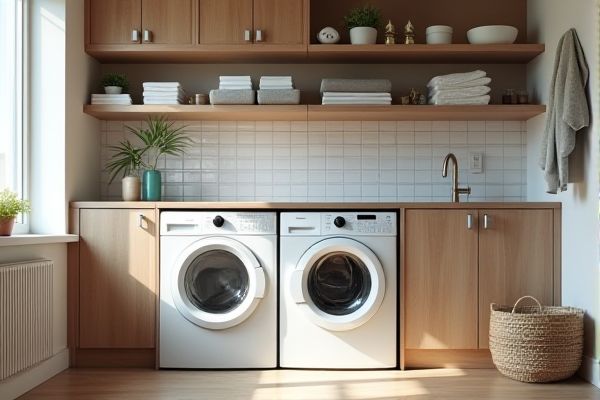
Vertical storage maximizes space by stacking items upward, ideal for small laundry rooms, while horizontal storage spreads items out, making them easier to access and organize on a single level. Discover which method suits your laundry setup best and enhances Your cleaning routine by reading the rest of the article.
Table of Comparison
| Feature | Vertical Storage Laundry | Horizontal Storage Laundry |
|---|---|---|
| Space Efficiency | Maximizes vertical space, ideal for small areas | Uses floor space extensively, requires larger area |
| Accessibility | Items stacked; may require bending or reaching up | Items laid out horizontally, easy to access |
| Capacity | Higher storage capacity in compact footprint | Limited by horizontal surface area |
| Organization | Better for categorized stacking with vertical dividers | Easy to spread out and sort laundry items |
| Installation | May need wall mounting or shelving units | Requires sturdy, level surfaces |
| Cost | Often more expensive due to specialized racks or shelves | Generally more affordable with basic shelving or bins |
| Ideal Use | Small apartments, limited floor space | Laundry rooms with ample floor space |
Introduction to Laundry Storage Solutions
Vertical storage maximizes space by utilizing height, making it ideal for small laundry rooms where floor area is limited. Horizontal storage offers easy access and organization of laundry essentials on shelves or cabinets spread across the wall length. Choosing the right solution ensures your laundry area remains functional and clutter-free, enhancing your overall efficiency.
Defining Vertical and Horizontal Storage
Vertical storage in laundry refers to organizing items by stacking them upward, utilizing tall shelving units or wall-mounted racks to maximize floor space efficiency. Horizontal storage arranges laundry essentials side-by-side on low shelves or in wide drawers, allowing easy access and visibility across the surface area. Understanding these storage orientations helps you select the best solution based on your space constraints and workflow preferences.
Space Efficiency: Vertical vs Horizontal
Vertical laundry storage maximizes space efficiency by utilizing height, ideal for small or narrow areas, allowing you to stack washers and dryers without expanding the floor footprint. Horizontal storage spreads appliances side by side, requiring more floor space but enabling easier access and maintenance. Choosing between vertical and horizontal storage depends on your laundry room dimensions and prioritizing either compactness or convenience.
Accessibility and Convenience Factors
Vertical storage in laundry rooms maximizes accessibility by utilizing wall space, allowing easy reach to detergents, fabric softeners, and cleaning tools at eye level. Horizontal storage offers convenience through wider surfaces for sorting and folding clothes, making it easier to spread out laundry tasks without bending or straining. Both storage types enhance organization, but vertical arrangements are ideal for tight spaces while horizontal setups provide greater workspace efficiency.
Impact on Laundry Room Organization
Vertical storage in laundry rooms maximizes space efficiency by utilizing height, allowing you to store detergents, fabric softeners, and cleaning supplies without cluttering countertops. Horizontal storage provides easy access to frequently used items, promoting a streamlined workflow and reducing time spent locating essentials. Balancing both storage types enhances organization, ensuring your laundry room remains tidy and functional.
Storage Capacity Comparison
Vertical storage in laundry setups maximizes floor space by utilizing height, often allowing for taller shelving units or stackable washers and dryers, which increases overall storage capacity in compact areas. Horizontal storage spreads storage components side by side, typically providing easier access but requiring more wall or floor space, limiting capacity in smaller rooms. Optimizing storage capacity depends on room dimensions; vertical configurations are ideal for narrow spaces, while horizontal layouts suit wider laundry rooms with ample floor area.
Aesthetics and Design Considerations
Vertical storage in laundry rooms maximizes space efficiency and creates a sleek, modern aesthetic with clean lines and minimal clutter. Horizontal storage offers more surface area for folding and organizing, blending functionality with a balanced, traditional design appeal. Your choice impacts the room's visual flow, so consider how each option complements your laundry area's overall style and spatial constraints.
Installation and Maintenance Requirements
Vertical storage laundry systems require less floor space and can be installed in tight or small areas, often mounted on walls or stacked units, making them ideal for compact homes. Maintenance tends to be easier due to accessible components and fewer structural parts, but periodic checks on mounting stability are essential. Horizontal storage laundry units typically need more floor space for installation and may require reinforced flooring to support the weight; their maintenance often involves cleaning accessible trays and parts at floor level.
Cost Implications of Each Storage Type
Vertical storage solutions in laundry rooms often involve higher initial costs due to specialized shelving units or stackable washers and dryers, but they maximize floor space efficiency, potentially reducing renovation expenses. Horizontal storage typically requires more square footage, leading to increased spatial allocation costs and potentially higher overall utility bills from less efficient appliance placement. Choosing vertical storage can offer long-term savings through optimized space usage and easier access, while horizontal setups might incur ongoing expenses tied to larger room sizes and less organized storage.
Choosing the Right Storage Solution for Your Needs
Vertical storage maximizes space efficiency by utilizing height, making it ideal for small laundry rooms or apartments. Horizontal storage offers easier access to laundry supplies and works well in wider, more open areas where surface space is abundant. Selecting between vertical and horizontal storage depends on your room dimensions, accessibility preferences, and the volume of items you need to organize.
 homyna.com
homyna.com